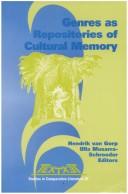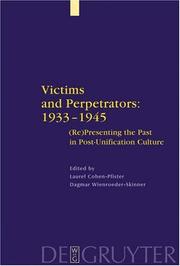| Listing 1 - 3 of 3 |
Sort by
|

ISBN: 9789042004405 9789004488878 Year: 2000 Publisher: Leiden;Boston BRILL
Abstract | Keywords | Export | Availability | Bookmark
 Loading...
Loading...Choose an application
- Reference Manager
- EndNote
- RefWorks (Direct export to RefWorks)
This volume deals with the inherent relation between literary genres and cultural memory. Indeed, generic repertoires may be regarded as bodies of shared knowledge (a sort of 'encyclopaedia' or 'museum' of stocked culture) and have played and still play an important role in absorbing and activating that memory. The contributors have focused on some specific memory-linked genres that prove especially relevant in remembering and transforming past experiences, i.e. the (post)modern historical novel and various forms of (post)modern autobiographical writing. They deal with such renowned authors as Carlos Fuentes, Vargas Llosa, Umberto Eco, Antonio Tabucchi, John Barth, Julian Barnes, Michel Butor, Nathalie Sarraute, Alain Robbe-Grillet, Claude Simon, Georges Perec and Marguerite Yourcenar. The volume, thus, constitutes an attractive and representative sample of (post)modern forms of rewriting and problematizing individual and collective pasts.
Collective memory --- Historical awareness --- Literary genres --- In literature --- Form, Literary --- Forms, Literary --- Forms of literature --- Genre (Literature) --- Genre, Literary --- Genres, Literary --- Genres of literature --- Literary forms --- Literary genetics --- Literary types (Genres) --- Literature --- Collective remembrance --- Common memory --- Cultural memory --- Emblematic memory --- Historical memory --- National memory --- Public memory --- Social memory --- Memory --- Social psychology --- Group identity --- National characteristics
Book
ISBN: 9783110188905 3110188902 9786612196676 1282196677 3110206722 9783110206722 9781282196674 661219667X Year: 2008 Volume: 373 Publisher: Berlin ; New York : Walter De Gruyter,
Abstract | Keywords | Export | Availability | Bookmark
 Loading...
Loading...Choose an application
- Reference Manager
- EndNote
- RefWorks (Direct export to RefWorks)
Historiographical documents from Ancient Greece have existed at least since the time of Herodotus; an historical awareness developed before his time, as evidenced in historical omnia, epic literature from Mesopotamia, in the texts of Hittite letters and treaties, and in Egyptian sources. The book explores the conceptual and formal characteristics of texts from different contexts and epochs from the 3rd millennium until the 5th century AD, together with the evolution of historical awareness and interest in historiography.
930.21 <3> --- 930.21 <3> Historiografie. Geschiedenis van de geschiedwetenschap--Plaatsaanduiding van de Oude Wereld --- Historiografie. Geschiedenis van de geschiedwetenschap--Plaatsaanduiding van de Oude Wereld --- History, Ancient --- Historiography. --- Greece --- Middle East --- Asia, South West --- Asia, Southwest --- Asia, Western --- East (Middle East) --- Eastern Mediterranean --- Fertile Crescent --- Levant --- Mediterranean Region, Eastern --- Mideast --- Near East --- Northern Tier (Middle East) --- South West Asia --- Southwest Asia --- Asia, West --- West Asia --- Western Asia --- Orient --- Historical Awareness.

ISBN: 3110189828 9783110189827 3110897474 9783110897470 Year: 2006 Volume: 2 Publisher: Berlin ; New York : W. de Gruyter,
Abstract | Keywords | Export | Availability | Bookmark
 Loading...
Loading...Choose an application
- Reference Manager
- EndNote
- RefWorks (Direct export to RefWorks)
This volume examines the politics of history and memory in Germany today through a review and analysis of seminal developments in the current discourse on 1933 - 1945. An interdisciplinary work, this book examines questions of representing the past from the perspective of literary studies, social psychology, film studies, history, and cultural studies. Themes include transgenerational memory and remembrance, the air war and German literature, commemoration and silences, transnational reconciliation, and historical consciousness in the German present. The collected essays make clear that as the current discourse contributes toward an historically informed, differentiated understanding of individuals' roles in the Third Reich and World War Two, victim and perpetrator identities cannot be defined as exclusive from one another. The discourse emphasizes personal over collective experience and answers questions of responsibility and guilt on the individual level.
Conflict of generations --- Holocaust, Jewish (1939-1945) --- Jews in literature. --- Memory --- World War, 1939-1945 --- History --- Moral and ethical aspects. --- Political aspects --- Historiography. --- Gap, Generation --- Generation gap --- Generational conflict --- Intergenerational conflict --- Generations --- Intergenerational relations --- Social conflict --- Diplomatic history --- Germany --- Weimar Republic --- Germanii︠a︡ --- Германия --- BRD --- FRN --- Jirmānīya --- جرمانيا --- Nimechchyna --- Gjermani --- Federalʹna Respublika Nimechchyny --- Veĭmarskai︠a︡ Respublika --- Ashkenaz --- Germanyah --- Bundesrepublik Deutschland --- Federal Republic of Germany --- Deutschland --- Repoblika Federalin'i Alemana --- República Federal de Alemania --- Alemania --- República de Alemania --- Bu̇gd Naĭramdakh German Uls --- Kholboony Bu̇gd Naĭramdakh German Uls --- KhBNGU --- ХБНГУ --- German Uls --- Germania --- Republika Federal Alemmana --- Deutsches Reich --- Grossdeutsches Reich --- Weimarer Republik --- Vācijā --- ドイツ --- Doitsu --- ドイツ連邦共和国 --- Doitsu Renpō Kyōwakoku --- Germany (Territory under Allied occupation, 1945-1955) --- Germany (Territory under Allied occupation, 1945-1955 : British Zone) --- Germany (Territory under Allied occupation, 1945-1955 : French Zone) --- Germany (Territory under Allied occupation, 1945-1955 : Russian Zone) --- Germany (Territory under Allied occupation, 1945-1955 : U.S. Zone) --- Germany (East) --- Germany (West) --- Holy Roman Empire --- Civilization --- Jewish influences. --- Race relations --- ドイツ レンポウ キョウワコク --- Deguo --- 德国 --- Gėrman --- Герман Улс --- Guilt. --- WW II (in literature). --- historical awareness. --- memory. --- Mémoire --- HOLOCAUSTE JUIF (1939-1945, SHOAH) DANS LA LITTERATURE --- HOLOCAUSTE JUIF (1939-1945, SHOAH) --- CONFLITS DE GENERATION --- JUIFS DANS LA LITTERATURE --- GUERRE MONDIALE (1939-1945) --- Aspect politique --- Allemagne --- MEMOIRE --- ALLEMAGNE --- HISTORIOGRAPHIE
| Listing 1 - 3 of 3 |
Sort by
|

 Search
Search Feedback
Feedback About UniCat
About UniCat  Help
Help News
News